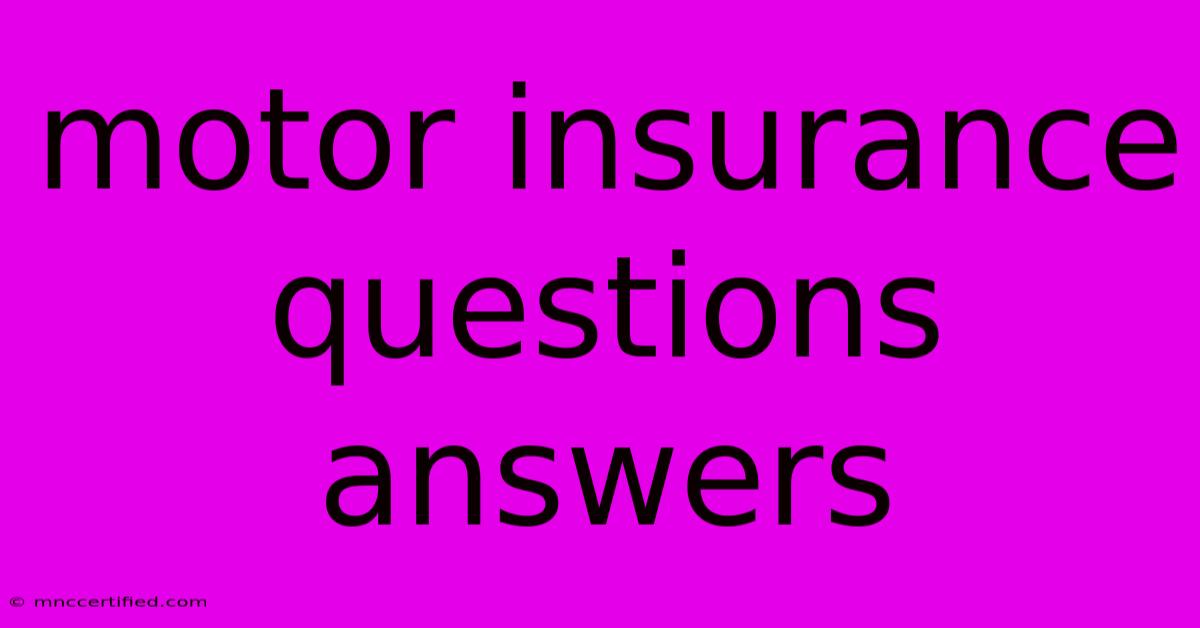Motor Insurance Questions Answers

Table of Contents
Motor Insurance Questions & Answers: Your Ultimate Guide
Choosing the right motor insurance can feel overwhelming. With so many policies and providers, understanding your needs and finding the best coverage is crucial. This comprehensive guide answers frequently asked questions about motor insurance, helping you navigate the process with confidence.
What is Motor Insurance?
Motor insurance, also known as car insurance, is a contract between you (the policyholder) and an insurance company. In exchange for regular payments (premiums), the insurer agrees to cover specific financial losses or liabilities arising from accidents or other incidents involving your vehicle. This coverage can include damage to your car, injuries to others, and legal costs. Failing to have adequate motor insurance can result in significant penalties.
Key Types of Motor Insurance Coverage
Several types of motor insurance offer varying levels of protection:
- Third-Party Only: This is the minimum legal requirement in many countries. It covers damage or injury you cause to others but not damage to your own vehicle.
- Third-Party, Fire & Theft: This adds coverage for fire damage and theft of your vehicle.
- Comprehensive: This offers the most extensive protection, covering damage to your own car, damage to other vehicles, injuries to others, and often includes additional benefits like roadside assistance.
Choosing the right type of coverage depends on your individual circumstances and risk tolerance. A new car might warrant comprehensive coverage, while an older vehicle might only need third-party cover.
What factors affect my motor insurance premium?
Your motor insurance premium is calculated based on several factors:
- Your driving history: Accidents, speeding tickets, and claims significantly impact your premium. A clean driving record usually translates to lower premiums.
- Your vehicle: The make, model, age, and value of your car influence the cost of insurance. Expensive or high-performance cars typically have higher premiums.
- Your location: Areas with higher accident rates often have higher insurance premiums.
- Your age and occupation: Younger drivers and certain occupations may face higher premiums due to perceived higher risk.
- Your annual mileage: Driving more miles increases your risk of an accident and, therefore, your premium.
- Your chosen coverage: Comprehensive cover is more expensive than third-party only. Adding optional extras will also increase your premium.
How to Find the Best Motor Insurance Deal
Finding the best motor insurance deal involves comparing quotes from different providers. Use comparison websites, but also check directly with individual insurers. Don't just focus on the cheapest option; consider the level of coverage offered. Read the policy documents carefully before committing to a policy.
What to do after a car accident?
Following a car accident, your immediate priorities are safety and securing evidence.
- Ensure everyone's safety: Check for injuries and call emergency services if necessary.
- Call the police: Report the accident to the police, especially if there are injuries or significant damage. Obtain a police report number.
- Exchange information: Get the other driver's details, including their name, address, driving license number, insurance details, and vehicle registration number.
- Take photos and videos: Document the damage to all vehicles, the accident scene, and any injuries.
- Contact your insurer: Report the accident to your insurer as soon as possible. Follow their instructions carefully.
Can I make a claim if it’s not my fault?
Yes, if the accident was not your fault, you can still make a claim on your motor insurance. Your insurer will typically investigate the accident and pursue a claim against the other driver's insurance company.
What are the consequences of driving without motor insurance?
Driving without motor insurance is illegal and carries severe penalties, including hefty fines, points on your license, and even imprisonment in some jurisdictions. It also leaves you financially exposed in the event of an accident.
Conclusion
Understanding motor insurance is vital for every driver. By carefully considering the different types of coverage, factors affecting premiums, and procedures to follow after an accident, you can choose the best policy to protect yourself and others on the road. Remember to regularly review your policy to ensure it still meets your needs. Don't hesitate to contact your insurer if you have any questions or require clarification on your policy terms.

Thank you for visiting our website wich cover about Motor Insurance Questions Answers. We hope the information provided has been useful to you. Feel free to contact us if you have any questions or need further assistance. See you next time and dont miss to bookmark.
Featured Posts
-
Rhode Island Commercial Insurance
Nov 19, 2024
-
Russia Warns Us About Ukraine Attacks
Nov 19, 2024
-
Sudden Loss Wilmington Theater Reacts
Nov 19, 2024
-
Franz Wagners Rise Foxs Scoring Spree
Nov 19, 2024
-
Swift Stunned By Bills Fans Reaction
Nov 19, 2024